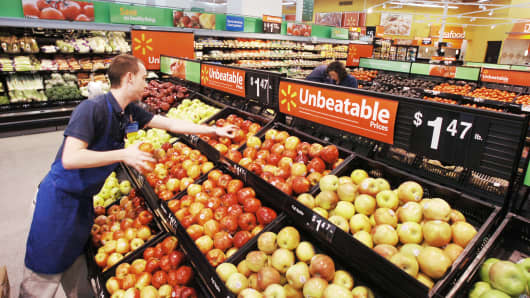Wal-Mart Stores said Monday that it will offer a money-back guarantee on the fruits and vegetables sold in its U.S. stores as it tries to gain share in the grocery business.
Wal-Mart is the largest grocer and produce seller in the country. It has already lowered prices on produce as it tries to get its shoppers, many of whom are on limited budgets, to buy healthier food. It is working on getting fresher produce to its stores more quickly and training its staff to do a better job of selling the goods.
The company is able to cut the time it takes to get produce into stores by buying directly from growers and relying on its own distribution centers and trucking systems. It has produce experts working with farmers in key growing regions and aims to double its sales of locally grown produce by December 2015.
Buying more local produce and cutting supply chain costs have helped Wal-Mart contain prices, which has been key in its push to stay ahead of rivals that include traditional grocers such as Kroger and drugstores such as Walgreen. Wal-Mart started to see sales gains in produce earlier this year after it began making improvements in produce handling.
Other chains, including Safeway, have offered guarantees on their produce, but the push by Wal-Mart, the nation's largest retailer, will have the most impact.
Customers not satisfied with their produce will not have to bring the item to receive a refund, only their receipt. To ensure that fresh produce makes it to the stores, third-party service providers will perform weekly checks in more than 3,400 stores selling produce, Wal-Mart said.




